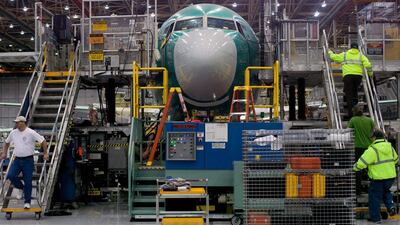Airbus and Boeing have received permission from the US government to sell aircraft to Iran, part of landmark deals potentially worth some US$50 billion in total following last year’s nuclear accord.
The announcements came as Iranian and US leaders are in New York for the United Nations General Assembly and show that the outgoing administration of the US president Barack Obama is honouring the economic terms of the nuclear pact.
The next administration, however, may change that equation for Airbus and Boeing, whose possible deal with Iran would be the biggest for an American company since the 1979 Islamic Revolution and US Embassy takeover.
European airplane manufacturer Airbus announced the licence from the US Treasury’s office of foreign assets control. Boeing followed with its own announcement later.
Although based in France, Airbus needed the approval of the US Treasury for the deal because at least 10 per cent of the manufacturer’s components are of American origin.
Airbus applied for two licences to cover its deal with Iran to ensure the fast delivery of some of the aircraft, said the Airbus spokesman Justin Dubon. The licence announced Wednesday covers the first 17 planes involved in the deal, which will be A320s and A330s, he said.
Dubon said Airbus hoped to receive a second license allowing it to sell the remaining planes to Iran soon.
In January, national carrier Iran Air signed agreements to buy 118 planes from Airbus, estimated to be worth some €22.8bn (Dh93.98bn). On Sunday, the state TV reported that Asghar Fakhrieh Kashan, a deputy transportation minister, said Iran would cut the number of Airbus planes to 112.
Base model A320s are listed at an average of $98 million, while A330s start at $231.5m. That puts the value of the approved 17 aircraft in the first licence around at least $1.8bn and possibly much higher based on list prices, although buyers typically negotiate sizable discounts for bulk orders.
Under Boeing’s deal, Iran Air will buy 80 aircraft with a total list price of $17.6bn, with deliveries beginning in 2017 and running until 2025. Iran Air also will lease 29 new Boeing 737s in a deal that Iranian officials have suggested would be worth some $25bn in total.
“We have received that licence and remain in talks with Iran Air” based on the memorandum of agreement reached in June, said the Boeing spokesman Marc Sklar .
The US Treasury spokeswoman Dawn Selak acknowledged her agency granted the first licences to Airbus and Boeing.
“These licences contain strict conditions to ensure that the planes will be used exclusively for commercial passenger use and cannot be resold or transferred to a designated entity,” Mr Selak.
Iran’s UN mission did not respond to a request for comment.
Iran’s nuclear deal with world powers, which limits its enrichment of uranium in exchange for the lifting of some international sanctions, specifically allowed for the purchase of aircraft and parts.
The licence approval clears the way for the two plane manufacturers to begin accessing one of the last untapped aviation markets in the world, home to 80 million people. However, western analysts are sceptical that there is demand for so many jets or available financing for two separate $25bn deals.
Most Iranian planes were purchased before the Islamic Revolution. Out of Iran’s 250 commercial planes, 162 were flying in June, while the rest were grounded due to lack of spare parts.
Iran Air, whose website lists 43 aircraft in its fleet, says it has direct flights to over 30 international destinations, including London.
The aircraft deal also has become a political issue in an election year in the US. Some American policymakers have criticised the Boeing deal to Iran over the country’s “pernicious behavior”, including launching ballistic missiles, firing rockets near US warships in the strategic Strait of Hormuz and briefly detaining American sailors who strayed into its territorial waters.
The US presidential election could also have an effect on the sales. The republican presidential candidate Donald Trump has threatened to tear up the nuclear deal if elected this November.
business@thenational.ae
Follow The National's Business section on Twitter

